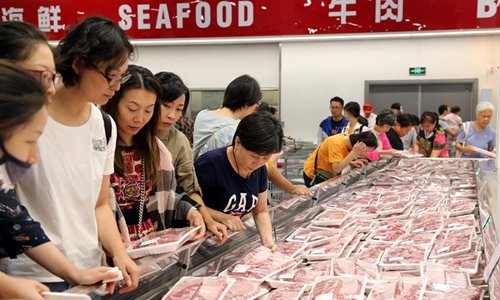HOME >> BUSINESS
Third batch of frozen pork set for release to stabilize market supplies, prices
By Song Lin Source:Global Times Published: 2019/9/26 21:28:40

Customers buy fresh pork in a Costco warehouse store in Minhang District, east China's Shanghai, Sept. 19, 2019. U.S. retail giant Costco Wholesale openend its first brick-and-mortar store on the Chinese mainland in late August. The store has been running for three weeks and customer passions remain unabated, with short-time queuing still required to enter the store. (Xinhua/Liu Ying)
China late on Thursday announced plans to release the third 10,000-ton batch of state pork reserves into the market, to further stabilize supplies and tame prices, which have soared due to outbreaks of African swine fever (ASF).
The China Merchandise Reserve Management Center, a state-owned company that manages the reserves, said on Thursday that it would auction the meat on Sunday. It has already auctioned two 10,000-ton batches of frozen pork so far this month, with the second one scheduled for Thursday afternoon.
Governments have been intensively rolling out measures to ease the tight supply of pork, such as releasing state reserves and subsidizing pig farms. Seven ministries and commissions have mentioned issues related to hog production or pork prices so far in September, domestic news site china.com.cn reported.
According to the Ministry of Commerce on Thursday, China has released three batches of reserve meat in September - 20,000 tons of pork, 2,400 tons of beef and 1,900 tons of mutton.
"The recent rounds of reserve meat releases could effectively tame the increasing pork price in the upcoming National Day holiday peak season," Wang Zuli, a research fellow with the Chinese Academy of Agricultural Sciences who closely follows the ASF situation in China, told the Global Times on Thursday.
Supplies will be strained for some time, Wang said, adding that the ASF epidemic has stabilized and the hog production has been improved.
A seminar on stabilizing pig production among large-scale pig breeding enterprises was held in Beijing on Wednesday, according to a statement of the Ministry of Agriculture.
The event was attended by 50 representative enterprises, six of which gave presentations on resuming and stabilizing pig production.
Local authorities and companies have also actively launched measures to increase pork supply. On September 14, East China's Zhejiang Province released a batch of pork from its reserves priced 30 percent below market levels, according to media reports.
Wens Foodstuff Group, an agribusiness group based in South China's Guangdong Province, plans to invest in a pig farm that could produce 600,000 hogs annually in Xinyi, Guangdong, with an expected annual value of 1.05 billion yuan ($147.3 million), reported by thepaper.cn on Wednesday.
Besides striving to resume pig production, China has started to expand imports. Pork imports through North China's Tianjin Port totaled 314,000 tons from January to August, up 30.8 percent year-on-year, chinanews.com reported on Thursday, citing data from Tianjin Customs.
Over half of the pork imported through Tianjin was from the EU recently, with average prices rising about 40 percent year-to-date, said the report.
China on September 13 announced plans to exempt US pork and soybeans from additional tariffs.
China bought 10,900 tons of US pork in the week ended September 5, according to data from the US Department of Agriculture.
Posted in: ECONOMY